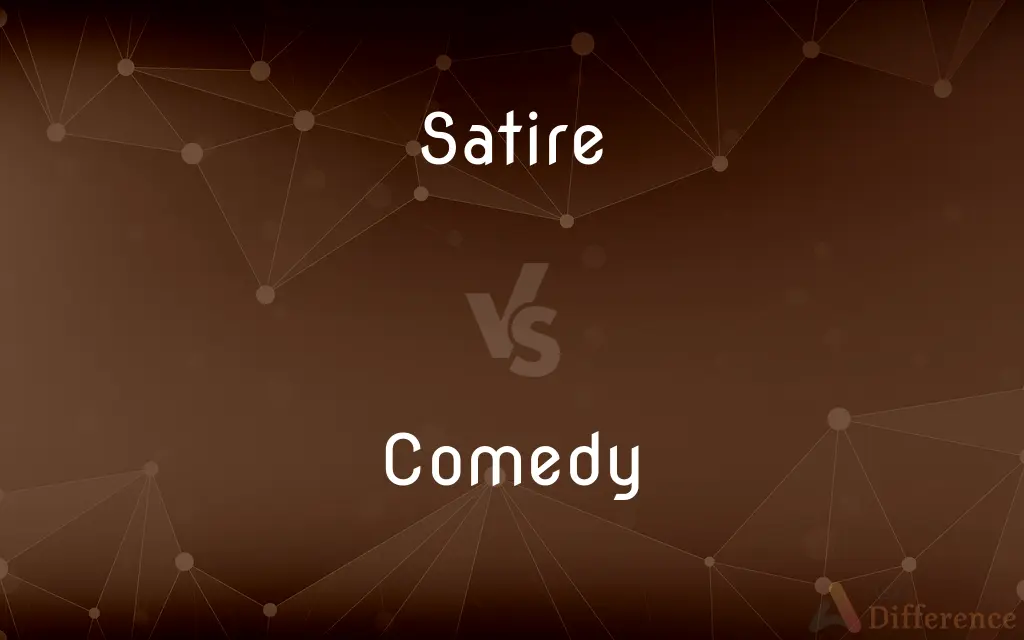Satire vs. Comedy — What's the Difference?
By Tayyaba Rehman — Updated on September 21, 2023
Satire is literary work that criticizes through humor. Comedy is genre intending to entertain and amuse. While satire often uses comedic elements to critique, not all comedy is satirical.

Difference Between Satire and Comedy
Table of Contents
ADVERTISEMENT
Key Differences
Satire and comedy are both forms of expression often used to entertain, but they serve different purposes. Satire is a literary or artistic form that uses irony, humor, and exaggeration to criticize or mock individuals, institutions, or societal norms. The primary intent of satire is not just to evoke laughter but to highlight flaws and provoke thought.
On the other hand, comedy is a broader genre that encompasses works created with the intention of amusing and entertaining the audience. Comedy focuses on evoking laughter and delight, often through situations, characters, or dialogues. While comedy can sometimes touch upon societal issues or individual quirks, its primary goal is entertainment.
Many confuse satire and comedy because satire often uses comedic tools to convey its message. For instance, a satirical piece might employ irony or absurdity to critique a political figure or a societal trend. However, the distinguishing factor remains: satire seeks to drive a critical message.
Conversely, comedy may not necessarily have a message to convey. It can be purely for entertainment. A slapstick comedy, for instance, might focus on physical humor without making any societal commentary. It's crucial to understand that while all satires have elements of comedy, not all comedies are satires.
Comparison Chart
Primary Purpose
Criticize and provoke thought through humor
Entertain and amuse the audience
ADVERTISEMENT
Tools Used
Irony, exaggeration, parody
Wit, slapstick, humor, timing
Message
Often has a critical message or commentary
May or may not have a deeper message
Scope
Narrower in intent, focused on critique
Broader genre, encompassing various comedic forms
Response Intended
Thought and laughter
Mainly laughter
Compare with Definitions
Satire
A means of mocking conventions using exaggeration.
Political cartoons often employ satire to make their point.
Comedy
A genre aiming to entertain and cause laughter.
The movie was a light-hearted comedy perfect for a weekend watch.
Satire
A technique using humor to criticize flaws.
Jonathan Swift's 'A Modest Proposal' is a classic example of satire.
Comedy
Entertainment based on timing and humor.
Stand-up comedy has gained immense popularity in recent years.
Satire
Commentary on human follies using humor.
Some believe that the best satires are those that hit closest to truth.
Comedy
Artistic work revolving around amusing situations.
Shakespeare's 'A Midsummer Night's Dream' is a classic comedy.
Satire
Literary work meant to provoke thought via ridicule.
Satire has been an essential tool for writers addressing societal concerns.
Comedy
A depiction of humorous characters and events.
The comedy show had the audience in splits throughout.
Satire
Satire is a genre of the visual, literary, and performing arts, usually in the form of fiction and less frequently non-fiction, in which vices, follies, abuses, and shortcomings are held up to ridicule, with the intent of shaming individuals, corporations, government, or society itself into improvement. Although satire is usually meant to be humorous, its greater purpose is often constructive social criticism, using wit to draw attention to both particular and wider issues in society.
Comedy
Narrative with a happy or cheerful ending.
After a tiring day, she relaxed by watching a comedy.
Satire
A literary work in which human foolishness or vice is attacked through irony, derision, or wit.
Comedy
Comedy (from the Greek: κωμῳδία, kōmōdía) is a genre of fiction comprised of discourses or works intended to be humorous or amusing by inducing laughter, especially in theatre, film, stand-up comedy, television, radio, books, or any other entertainment medium. The term originated in Ancient Greece: in Athenian democracy, the public opinion of voters was influenced by political satire performed by comic poets in theaters.
Satire
The branch of literature constituting such works.
Comedy
Professional entertainment consisting of jokes and sketches, intended to make an audience laugh
The show combines theatre with the best of stand-up comedy
A cabaret with music, dancing, and comedy
Satire
Irony, sarcasm, or caustic wit used to attack or expose human foolishness or vice.
Comedy
A play characterized by its humorous or satirical tone and its depiction of amusing people or incidents, in which the characters ultimately triumph over adversity
Shakespeare's comedies
Satire
(uncountable) A literary device of writing or art which principally ridicules its subject often as an intended means of provoking or preventing change or highlighting a shortcoming in the work of another. Humor, irony, and exaggeration are often used to aid this.
Comedy
A dramatic work that is light and often humorous or satirical in tone and that usually contains a happy resolution of the thematic conflict.
Satire
(countable) A satirical work.
A stinging satire of American politics.
Comedy
The genre made up of such works.
Satire
Severity of remark.
Comedy
A literary or cinematic work of a comic nature or that uses the themes or methods of comedy.
Satire
A composition, generally poetical, holding up vice or folly to reprobation; a keen or severe exposure of what in public or private morals deserves rebuke; an invective poem; as, the Satires of Juvenal.
Comedy
Popular entertainment composed of jokes, satire, or humorous performance.
Satire
Keeness and severity of remark; caustic exposure to reprobation; trenchant wit; sarcasm.
Comedy
The art of composing or performing comedy.
Satire
Witty language used to convey insults or scorn;
He used sarcasm to upset his opponent
Irony is wasted on the stupid
Satire is a sort of glass, wherein beholders do generally discover everybody's face but their own
Comedy
A humorous element of life or literature
The human comedy of political campaigns.
Satire
Artistic form highlighting societal issues through irony.
Many late-night talk shows use satire to comment on current events.
Comedy
A humorous occurrence.
Comedy
A choric song of celebration or revel, especially in Ancient Greece.
Comedy
(countable) A light, amusing play with a happy ending.
Comedy
A narrative poem with an agreeable ending (e.g., The Divine Comedy).
Comedy
A dramatic work that is light and humorous or satirical in tone.
Comedy
(drama) The genre of such works.
Comedy
(uncountable) Entertainment composed of jokes, satire, or humorous performance.
Why would you be watching comedy when there are kids starving right now?
Comedy
The art of composing comedy.
Comedy
(countable) A humorous event.
Comedy
A dramatic composition, or representation of a bright and amusing character, based upon the foibles of individuals, the manners of society, or the ludicrous events or accidents of life; a play in which mirth predominates and the termination of the plot is happy; - opposed to tragedy.
With all the vivacity of comedy.
Are come to play a pleasant comedy.
Comedy
Light and humorous drama with a happy ending
Comedy
A comic incident or series of incidents
Common Curiosities
Is comedy always meant to be funny?
Yes, comedy's primary goal is to entertain and amuse.
Are all comedies light-hearted?
While many comedies are light-hearted, some can touch upon serious issues humorously.
What are common elements in comedy?
Common comedic elements include wit, timing, slapstick, and humor.
What is the primary purpose of satire?
Satire aims to criticize and provoke thought through humor.
Why is satire important?
Satire can highlight societal issues, prompting reflection and change.
What tools does satire often use?
Satire frequently uses irony, exaggeration, and parody.
Can a work be both satirical and comedic?
Yes, many satirical works use comedy to convey their message.
Is satire always critical?
Typically, satire has a critical element, highlighting flaws or ridiculing conventions.
Can a tragedy have elements of comedy?
Yes, some tragedies can have comedic moments or characters, often for relief.
Which is older: satire or comedy?
Both forms are ancient, with roots in classical literature and theater.
Is satire always humorous?
While satire often employs humor, it can sometimes be dark or serious in tone.
Are all comedies satirical?
No, while some comedies may be satirical, not all contain a critique.
Can satire be visual?
Yes, visual mediums like cartoons or films can also be satirical.
What's a comedic relief?
Comedic relief is a humorous scene or character in a serious work to lighten the mood.
How can one differentiate between satire and comedy?
Satire focuses on critique using humor, while comedy primarily aims to entertain.
Share Your Discovery

Previous Comparison
Relabeled vs. Relabelled
Next Comparison
Brooch vs. BrochAuthor Spotlight
Written by
Tayyaba RehmanTayyaba Rehman is a distinguished writer, currently serving as a primary contributor to askdifference.com. As a researcher in semantics and etymology, Tayyaba's passion for the complexity of languages and their distinctions has found a perfect home on the platform. Tayyaba delves into the intricacies of language, distinguishing between commonly confused words and phrases, thereby providing clarity for readers worldwide.














































